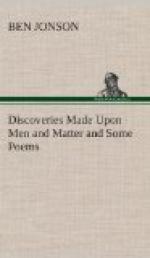Clementia.—Machiavell.—A prince should exercise his cruelty not by himself but by his ministers; so he may save himself and his dignity with his people by sacrificing those when he list, saith the great doctor of state, Machiavell. But I say he puts off man and goes into a beast, that is cruel. No virtue is a prince’s own, or becomes him more, than this clemency: and no glory is greater than to be able to save with his power. Many punishments sometimes, and in some cases, as much discredit a prince, as many funerals a physician. The state of things is secured by clemency; severity represseth a few, but irritates more. {74a} The lopping of trees makes the boughs shoot out thicker; and the taking away of some kind of enemies increaseth the number. It is then most gracious in a prince to pardon when many about him would make him cruel; to think then how much he can save when others tell him how much he can destroy; not to consider what the impotence of others hath demolished, but what his own greatness can sustain. These are a prince’s virtues: and they that give him other counsels are but the hangman’s factors.
Clementia tutela optima.—He that is cruel to halves (saith the said St. Nicholas {74b}) loseth no less the opportunity of his cruelty than of his benefits: for then to use his cruelty is too late; and to use his favours will be interpreted fear and necessity, and so he loseth the thanks. Still the counsel is cruelty. But princes, by hearkening to cruel counsels, become in time obnoxious to the authors, their flatterers, and ministers; and are brought to that, that when they would, they dare not change them; they must go on and defend cruelty with cruelty; they cannot alter the habit. It is then grown necessary, they must be as ill as those have made them: and in the end they will grow more hateful to themselves than to their subjects. Whereas, on the contrary, the merciful prince is safe in love, not in fear. He needs no emissaries, spies, intelligencers to entrap true subjects. He fears no libels, no treasons. His people speak what they think, and talk openly what they do in secret. They have nothing in their breasts that they need a cypher for. He is guarded with his own benefits.
Religio. Palladium Homeri.—Euripides.—The strength of empire is in religion. What else is the Palladium (with Homer) that kept Troy so long from sacking? Nothing more commends the Sovereign to the subject than it. For he that is religious must be merciful and just necessarily: and they are two strong ties upon mankind. Justice the virtue that innocence rejoiceth in. Yet even that is not always so safe, but it may love to stand in the sight of mercy. For sometimes misfortune is made a crime, and then innocence is succoured no less than virtue. Nay, oftentimes virtue is made capital; and through the condition of the times it may happen that that may be punished with our praise. Let no man therefore murmur at the actions of the prince, who is placed so far above him. If he offend, he hath his discoverer. God hath a height beyond him. But where the prince is good, Euripides saith, “God is a guest in a human body.”




